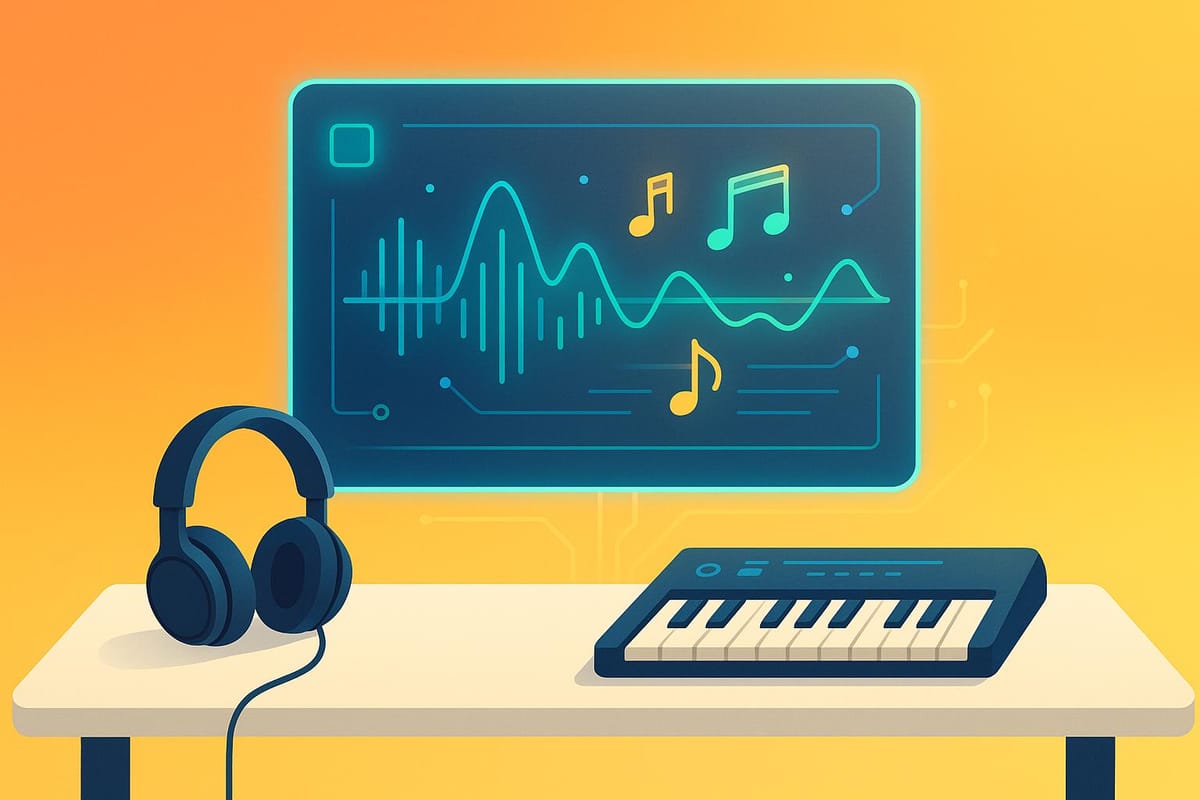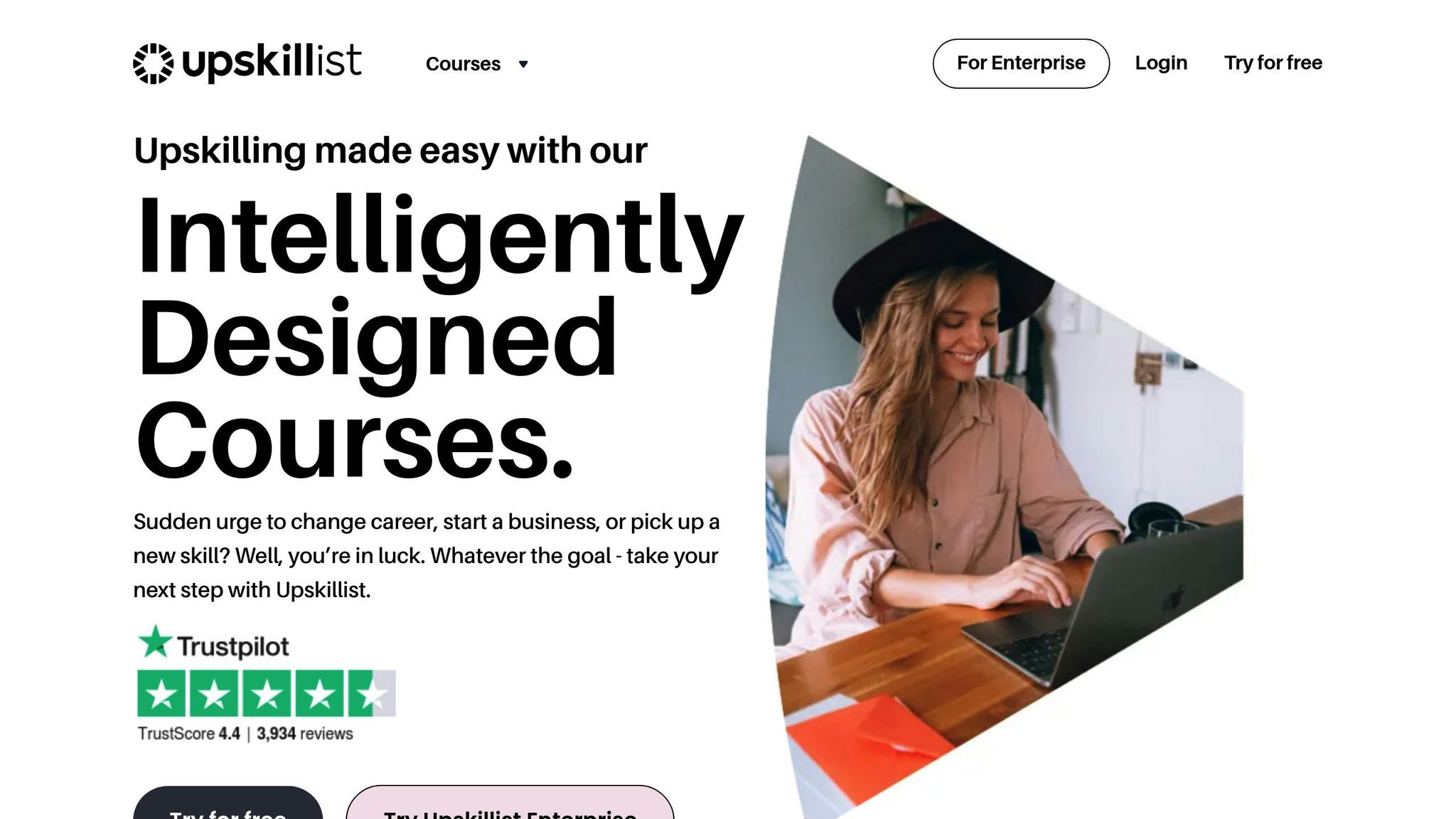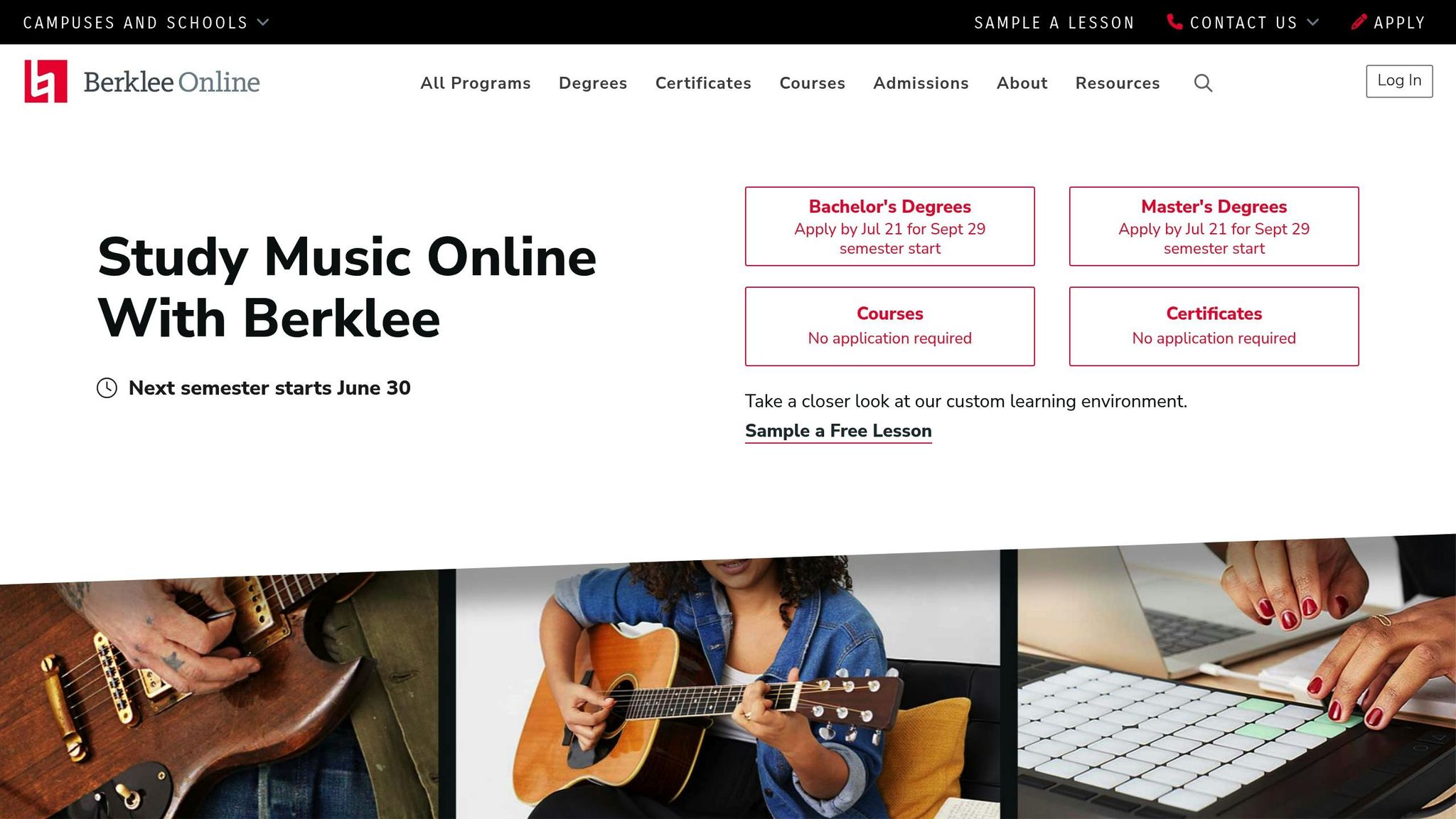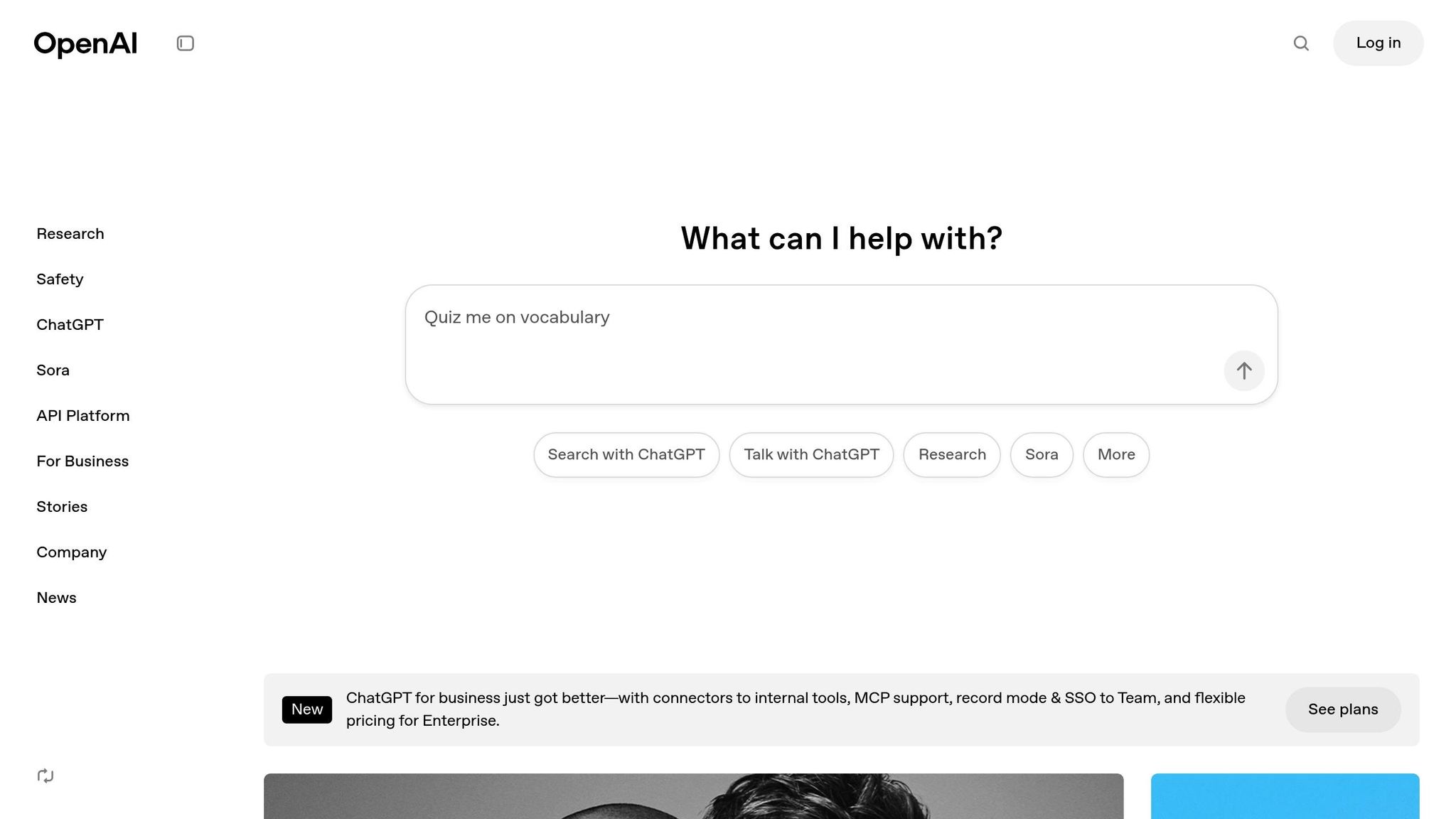Best Online Music Generation Courses in 2025
Explore the top online music generation courses of 2025 that combine AI technology with hands-on learning to enhance your music production skills.

AI tools are transforming music creation, and online courses are helping musicians stay ahead. Here’s a quick look at the top courses in 2025 to learn AI-powered music production:
- Upskillist: Self-paced course blending music theory and AI tools. Cost: $39.99/month. Offers CPD-accredited certifications.
- Berklee Online: 4-week course on AI in music. Cost: $515. Accredited by NECHE. Includes hands-on AI production techniques.
- OpenAI's Jukebox Tutorials: Free resources for AI music generation. Requires some technical knowledge.
- Udio: Free AI music creation platform with text-to-music capabilities. Paid plans start at $10/month for advanced features.
- LSTM Melody Generation Course: Free, technical course on building AI models for music using Python and TensorFlow.
Quick Comparison
| Course | Cost | Duration | Accreditation | AI Focus | Flexibility | Unique Features |
|---|---|---|---|---|---|---|
| Upskillist | $39.99/month | Self-paced | CPD Certified | AI tools + music theory | Lifetime access | Personalized learning paths |
| Berklee Online | $515 | 4 weeks | NECHE Accredited | AI in music production | Weekly modules | University-level curriculum + credit option |
| OpenAI Jukebox Tutorials | Free | Self-paced | None | AI music generation | Self-guided | Open-source, technical exploration |
| Udio | Free/$10+ | Self-paced | None | Text-to-music AI | Daily credits | Copyright-free music ownership |
| LSTM Melody Generation | Free | Self-paced | None | AI model building | Self-guided | Technical skills in Python and TensorFlow |
These courses cater to different needs - whether you’re a beginner exploring AI music tools or a professional seeking formal training. Choose based on your goals, budget, and learning style.
1. Course Overview - Generative Music AI
How to Choose a Music Generation Course
Selecting the right music generation course can significantly enhance your skills and career prospects. With AI-powered music tools advancing rapidly, understanding what to prioritize can help you make the most of your educational investment.
Course Content Relevance
Look for courses that dive into AI models, algorithms, and tools specifically designed for music production. A well-rounded curriculum should address the entire music creation process - from initial composition and production to final distribution. Don’t overlook courses that also touch on legal and ethical considerations, as these are becoming increasingly important in the AI-driven music industry.
Instructor Expertise
The best instructors combine in-depth knowledge of AI with hands-on experience in music production. As Carlos Arana, Author & Instructor at Berklee Online, puts it:
"The essential mission of this course is to, as much as possible, lift the veil and demystify the AI models and tools. The goal is to teach you about the current models and apps in the market, their utility and scope."
Seek out courses led by educators with strong credentials and a proven ability to engage and inspire students.
Hands-On Learning Opportunities
Practical experience is key. Choose courses that let you work directly with AI tools. This interactive approach is effective - 85% of students reported improved music production skills after completing online courses with hands-on components.
Flexibility and Accessibility
Self-paced courses are ideal if you’re juggling studies with other commitments. If your goal is to learn to mix music , this flexible format allows you to fit practice sessions into a busy schedule. Additionally, having access to post-class materials ensures you can revisit lessons and continue learning long after the course ends.
Accreditation and Recognition
Enrolling in a course from an accredited institution can add weight to your credentials. For instance, Berklee Online, accredited by the New England Commission of Higher Education (NECHE), has won University Professional and Continuing Education Association (UPCEA) awards for 18 consecutive years (2005–2023).
Pricing Considerations
Course fees can vary significantly. For example, Berklee Online offers an AI for Music and Audio course for $515 over 4 weeks, while DSDT School’s year-long AI Technology – Music Production program costs $5,000. Interestingly, Berklee Online's tuition is about 64% lower than the on-campus costs at their Boston location.
Feedback and Community Support
A strong support system can make a big difference. Prioritize courses that provide regular feedback from instructors and peers. This collaborative environment not only helps refine your skills but also fosters valuable industry connections.
Real-World Applications
The course should demonstrate how AI tools are evolving beyond basic assistants to become collaborative partners in music creation. For example, professional studios using AI mastering systems have cut production time by 40% without compromising quality.
AI certification can also boost your career by equipping you with practical skills that enhance job performance and earning potential. A 2022 survey revealed that 65% of independent artists using AI mastering tools saw increased streaming engagement. These real-world examples highlight the importance of choosing a course that aligns with the demands of today’s AI-driven music industry. Use these factors as a guide when exploring the options ahead.
1. Upskillist Music Generation Course

In a world where AI is shaping the future of music, Upskillist offers a course that blends cutting-edge technology with the core principles of music creation. Known for its strong reputation in online education, Upskillist combines traditional music theory with modern AI tools, making it a standout option for aspiring musicians. With over 30 million students taught and a Trustpilot rating of 4.4 from 3,933 reviews, the platform has built a solid foundation of trust. Here's a closer look at what makes this course unique.
Learn with AI Tools and Modern Production Techniques
The Music Generation Course dives deep into the essentials of music creation today. From mastering instruments and understanding music theory to exploring sound engineering, the course covers it all. Each program includes 20 hours of practical, expert-led training, offering a hands-on approach to prepare students for real-world music production challenges.
Designed for Busy U.S. Learners
Upskillist understands the need for flexibility, especially for learners in the U.S. The platform offers on-demand classes and even includes a pause feature, making it easier to fit lessons into a busy schedule.
Affordable Pricing with Added Benefits
For $39.99 per month, Upskillist provides access to its Music Generation Course, along with a free trial to explore the content without commitment. A subscription also unlocks over 80 additional courses, allowing students to expand their knowledge into areas like audio engineering or the music business as their interests grow.
Accreditation and Recognized Certification
Upskillist's certificates are accredited by the CPD Certification Service, ensuring they meet high standards. These certifications are backed by collaborations with universities, industry professionals, and academic experts and are recognized by global institutions .
Students who complete all module-based assignments earn a diploma certificate validated by the CPD Certification Service. As Upskillist explains:
"By working with universities, industry and academic experts, Upskillist ensures its education delivery provides a diploma for students that is externally validated and recognised by global institutional leaders."
For those who prefer a physical copy of their diploma, customer support can assist in providing one .
2. Berklee Online: AI for Music and Audio

Berklee College of Music has long been celebrated for its top-tier music education, and Berklee Online extends that tradition into the digital world. The AI for Music and Audio course dives into how artificial intelligence is transforming the music industry. With over 75,000 students from 164 countries, Berklee Online connects learners worldwide.
Hands-On Learning with AI Tools and Music Production
Staying true to its reputation, Berklee Online offers a 4-week, 1-credit course that provides practical experience with cutting-edge AI technologies. The curriculum covers topics like music representation, signal processing, and music information retrieval (MIR). Students explore rhythm detection, melody extraction, chord detection, source separation, and even mixing and mastering techniques. Additionally, it introduces generative AI and neural networks for creating original music. The course is designed for accessibility - no coding knowledge is required, but Python resources are available for those who wish to explore the technical aspects.
Dr. Carlos Arana, the course leader, shares his vision:
"The mission of this course is to lift the veil and demystify the AI models and tools. I want to teach students how to coexist with current AI tools to enhance and increase the productivity and efficiency of their music-related activities and workflow."
Flexible Options for U.S. Students
This course is tailored for professionals with busy schedules. Whether taken for credit or non-credit, the 4-week format makes it easy to fit into demanding routines.
Affordable Pricing and Exceptional Value
At $515, this course provides access to world-class instruction at a fraction of the cost of on-campus tuition - 64% less, to be exact. It’s an accessible way to gain advanced skills in AI-driven music production .
Accreditation and Certification
The course is fully accredited by the New England Commission of Higher Education and recognized by UPCEA. It also counts toward Berklee's certificate and degree programs, adding further value to your learning journey.
3. OpenAI's Jukebox Tutorials

OpenAI's Jukebox is an advanced neural network designed to generate music, including basic vocal components, as raw audio. It spans a variety of genres and mimics the styles of different artists. Released in 2020 as a research project, Jukebox was trained on a massive dataset of over 1.2 million songs, with around 600,000 of them in English.
AI Tools and Modern Music Creation
Jukebox stands out by generating raw audio complete with vocals, instead of just MIDI files or instrumental tracks. It conditions its output based on artist, genre, and even lyrics. At its core, Jukebox uses a VQ-VAE autoencoder model to compress raw audio into a discrete representation and employs a hierarchical probabilistic sampling framework to tackle the complexities of music generation.
However, the model does have its limitations. For instance, generating just one minute of audio can take up to 9 hours. Additionally, the output sometimes lacks familiar musical structures and may include occasional artifacts. These challenges provide learners with a better understanding of the technical demands and limitations of AI-driven music tools.
Flexible Learning Options for U.S. Users
Although OpenAI no longer actively maintains Jukebox, the platform still offers plenty of resources for independent learners. These include detailed research papers, source code, and tools for exploring sample outputs. For practical use, Jukebox performs best on platforms like Google Colab, which supports integration with Google Drive for project storage. This setup allows users to experiment with a variety of inputs, such as lyrics, genres, song lengths, and artist styles, offering a flexible and hands-on learning experience.
Cost and Accessibility
Exploring Jukebox is entirely free under its basic usage tier. The only potential cost involves upgrading Google Colab to access more powerful computational resources if needed. Jukebox is rated highly for its performance, scoring 4.5/5 for accuracy, 4.7/5 for functionality, and 4.3/5 for cost-efficiency. This makes it a great option for learners who want to dive into AI-powered music production without breaking the bank. While the learning curve is moderate (3.8/5 for ease of use), its open-source nature makes it an excellent resource for developers, researchers, and music creators eager to explore the technical aspects of AI-generated music.
4. Udio's Free AI Music Creation Platform
Udio, launched in 2023 by a team of industry experts, offers a groundbreaking platform for music creation powered by artificial intelligence. Designed to turn simple text prompts into fully realized musical compositions, Udio is perfect for anyone curious about how AI can interpret and produce music. Whether you're an aspiring musician or just experimenting with creative tools, Udio provides an engaging way to explore the intersection of AI and music.
AI Tools and Modern Music Production at Your Fingertips
Udio stands out with two primary modes: transforming text descriptions into music and extending existing audio tracks. This dual functionality gives users the ability to both create new compositions and refine existing ones. The platform's audio extension feature is particularly useful for co-production, as it carefully builds upon the input audio without straying too far.
The process starts with a simple text prompt, like "a song about summer rain." Users can refine the output by adding genre and style tags, such as "jazz, mellow, warm", or even specific stylistic instructions like "in the style of Billie Holiday." While it doesn't replicate an artist's voice, it captures the essence of their musical feel. Udio also includes intuitive editing tools, allowing users to tweak tracks, adjust sections, and extend compositions - all from a mobile-friendly interface. Importantly, any music generated through Udio is copyright-free and fully owned by the user, making it ideal for personal and commercial projects.
Accessibility for Musicians of All Levels
Udio’s design prioritizes accessibility, catering to both seasoned musicians and complete beginners. Its self-paced approach, coupled with a daily credit system in the free plan, encourages users to practice regularly without feeling overwhelmed. Beyond creating music, users can share their work within an active and supportive community.
That said, some users have noted occasional inconsistencies in thematic development, which highlights the evolving nature of AI in music production. Understanding these limitations can help users set realistic expectations while exploring this exciting technology.
Pricing Options and Value in USD
Udio’s free plan offers 10 daily credits, enabling users to generate and export songs at no cost. For those seeking more advanced features, the Standard plan costs $10/month and includes audio uploads, advanced editing tools (like negative prompting), high-quality exports, and additional credits. The Pro plan, priced at $30/month, adds early access to new tools alongside all the features of the Standard tier.
With a solid app rating of 4.4, Udio has received praise for its creative tools, though some users have reported technical glitches, particularly with remixing features after upgrading their subscription. Despite these minor issues, Udio is reshaping the music creation landscape by giving anyone with an idea access to professional-grade tools. For those eager to dive into AI-driven music without a hefty investment, the free tier provides an excellent starting point.
5. LSTM and Neural Network-Based Melody Generation Course
When it comes to learning AI-driven music creation, LSTM-based melody generation offers a great mix of technical depth and accessibility. For those eager to dive into the mechanics of AI music, the LSTM and Neural Network-Based Melody Generation Course provides a detailed exploration of this tried-and-true method. LSTM networks are particularly well-suited for capturing the flow of melodies over time, offering a level of interpretability and control that makes them a favorite for AI music enthusiasts.
What makes LSTM stand out from newer architectures, like transformers, is its simplicity. While transformers might produce more intricate compositions, LSTM's straightforward design allows users to better understand and shape their results. This makes it an excellent starting point for musicians who want to get hands-on with AI music creation, rather than relying on a "black box" approach.
Hands-On Learning with AI Tools and Techniques
This course focuses on building and training LSTM networks using tools like TensorFlow, Keras, h5py, Timidity, FFmpeg, and music21. Students get to encode songs as time series data, which forms the basis for generating melodies with LSTM. The curriculum dives into key topics such as data preprocessing, designing model architectures, and training sequences to turn raw musical data into structured melodies.
Yi-Jen Mon's teaching approach highlights practical applications, guiding learners through tasks like analyzing musical patterns, setting learning parameters, and constructing LSTM models to generate coherent melodies. The course also introduces advanced techniques, blending LSTM with elements from transformer architectures and CNNs. For instance, students learn how to combine LSTM with Convolutional Neural Networks (CNNs) to extract features from musical score matrices.
One of LSTM's practical benefits is its efficiency. Unlike some resource-heavy AI models, LSTM works well with fewer computational resources and smaller datasets. This makes it an accessible option for learners who may not have access to high-performance hardware or extensive data.
Flexible Learning Options for U.S. Students
The course is primarily offered through free online resources, such as YouTube tutorials and open educational materials. This format gives U.S. students the flexibility to fit learning into their schedules, whether they’re balancing work, school, or other responsibilities.
Its self-paced structure is particularly helpful for tackling complex topics like neural network design and integrating music theory. Since the course combines programming with musical concepts, this flexibility ensures learners from various backgrounds can progress at their own pace. The free, self-guided approach fits perfectly with the broader effort to make AI-driven music education more accessible.
Cost in USD and Practical Benefits
The LSTM and Neural Network-Based Melody Generation course, available through platforms like Class Central, is entirely free. The only cost is the time and effort required to master both the programming and music theory aspects of melody creation. Students should be ready to invest significant time in learning preprocessing methods, designing models, and training their networks.
The skills gained from this course are particularly valuable in today’s AI landscape. With the global AI market projected to reach $15 trillion by 2030 and revenue estimates hitting $118 billion, expertise in AI music generation positions students for exciting opportunities in a booming industry.
Although the course doesn’t provide formal certification, the hands-on experience with tools like TensorFlow and Keras can help students build a portfolio that showcases their technical abilities. By offering in-depth training at no cost, this course demonstrates how AI tools can open up new possibilities for music creation to a wider audience.
Course Comparison Chart
When deciding on a course, your goals, budget, and preferred learning style play a big role. The table below breaks down some of the top courses for 2025, highlighting key details to help you make an informed choice.
| Course | Cost (USD) | Duration | Accreditation | AI/Technology Focus | Flexibility | Unique Offerings |
|---|---|---|---|---|---|---|
| Upskillist Music Generation Course | 7-day free trial, then subscription | Self-paced | Globally recognized certifications | AI-powered learning tools (Compass AI, Pathfinder) | Flexible scheduling, lifetime access to lessons | Personalized learning paths, interactive online classes, 100+ subjects |
| Berklee Online: AI for Music and Audio | $515 (1-credit course) | 4 weeks | New England Commission of Higher Education (NECHE) accredited | AI applications in music analysis, production, and composition | Structured timeline with weekly modules | University-level curriculum and college credit option |
| Udio's Free AI Music Creation Platform | Free | Self-paced | No formal accreditation | Real-time AI music generation | Unrestricted learning pace | Instant music creation without requiring technical knowledge |
Each course offers a distinct value depending on what you're looking for. Berklee Online stands out with its $515 price tag, which includes full university accreditation from the New England Commission of Higher Education. This makes it an attractive option for learners seeking formal academic credentials or planning to pursue advanced studies in music technology.
For those on a tight budget, free courses like Udio's platform are a great way to explore AI-driven music creation. This is especially relevant as the AI music market is projected to skyrocket, growing from $3.9 billion in 2023 to an estimated $38.7 billion by 2033, with an annual growth rate of 25.8%.
Flexibility is another key factor. Upskillist offers self-paced learning with lifetime access, enhanced by AI-powered tools like Compass AI and Pathfinder. Berklee Online, on the other hand, follows a more structured approach with weekly modules, ideal for those who thrive on a set schedule. Udio keeps things simple and accessible, focusing on real-time music creation without the need for technical expertise.
Accreditation is critical for learners aiming to boost their professional credentials. Berklee Online and Upskillist both provide recognized certifications - Berklee through university credits and Upskillist with globally accepted certifications. This makes them appealing for career-focused individuals or students planning to transfer credits into degree programs.
Ultimately, whether you're looking for free resources, formal accreditation, or AI-powered tools, these courses cater to the growing demand for modern, AI-driven music education. Each option aligns with the evolving landscape of music production, offering a mix of accessibility, professional value, and cutting-edge technology.
Conclusion
AI-powered courses are transforming the way music is created and learned, pushing U.S. learners to seek programs that blend convenience, accreditation, and cutting-edge technology. In this evolving space, platforms like Upskillist are stepping up to meet these needs.
Upskillist’s Music Generation Course offers a well-rounded package: 20 hours of immersive training, globally recognized certifications, and a price tag of just $39.99 per month (with a 7-day free trial). With tools like Compass AI and Pathfinder, it provides personalized learning experiences while boosting your professional credibility.
"The most effective online music class for you will align with both your musical goals and preferred learning style."
This advice from Interlochen Online underscores the importance of choosing a program that matches your aspirations and learning preferences .
Start by defining your musical goals. Whether you're aiming to compose, produce, or perform, having clear objectives is crucial. With online education having grown by 900% since 2000 and over 70% of students now favoring digital learning, there’s never been a better time to embrace this shift. Take advantage of these AI-driven advancements to shape your music career and invest in your creative future today.
FAQs
How can I choose the right AI-powered music generation course for my skill level and career goals?
Choosing an AI-powered music generation course starts with understanding your current skill level and what you hope to achieve. If you're a beginner, look for courses that cover the basics of AI and music creation in a straightforward, approachable way. These should focus on building a strong foundation without overwhelming you.
For those with more experience, seek out courses that explore advanced AI tools and techniques, particularly those designed for professional music production. These courses often offer deeper insights and practical applications that can elevate your work.
Consider your goals. Are you aiming to experiment creatively, master technical skills, or develop expertise for a specific industry? Choose a course that aligns with your objectives and includes hands-on projects or tools that resonate with your interests. Finally, don’t forget to review course feedback and prerequisites to make sure it fits your learning needs.
Why should I choose an accredited music course, and how can it boost my career in the music industry?
Why Choose an Accredited Music Course?
Enrolling in an accredited music course comes with clear benefits that can shape your career in the music industry. Accreditation means the program has been evaluated and meets certain quality standards, which adds weight to your credentials. This can help you gain recognition from employers, industry professionals, and institutions, giving you an edge in a highly competitive field.
Beyond credibility, accredited courses often include hands-on training and opportunities to connect with industry professionals. These experiences are key for developing practical skills and building a network of contacts. Plus, completing an accredited program can open doors to advanced roles, collaborations, and even further education, setting you up for a solid and lasting career in music production and creation.
What skills can I learn from an AI music generation course, and how can they be used in real-world music production?
By enrolling in an AI music generation course, you'll gain hands-on skills like working with AI-driven tools to compose music, understanding the mechanics behind generative algorithms, and using machine learning techniques in music production. These abilities can help you craft original music, simplify your production workflow, and explore bold, new sonic ideas.
In practice, these skills are incredibly useful for musicians, producers, and content creators aiming to stay relevant in today's ever-changing digital music scene. Whether you're working on personal projects, professional tracks, or simply experimenting with fresh creative approaches, these tools can elevate your process and give you a competitive edge.

